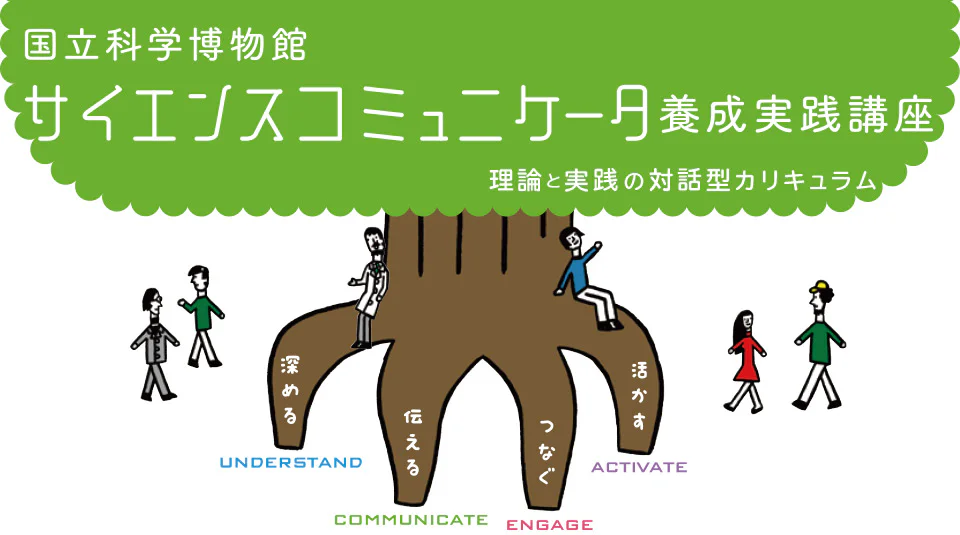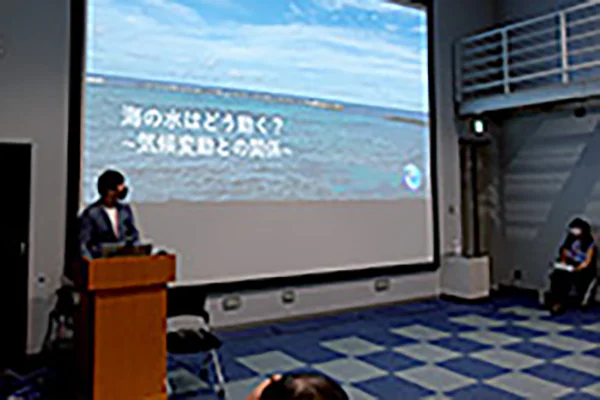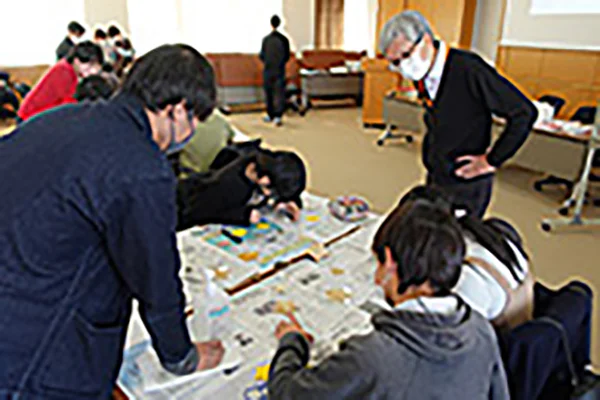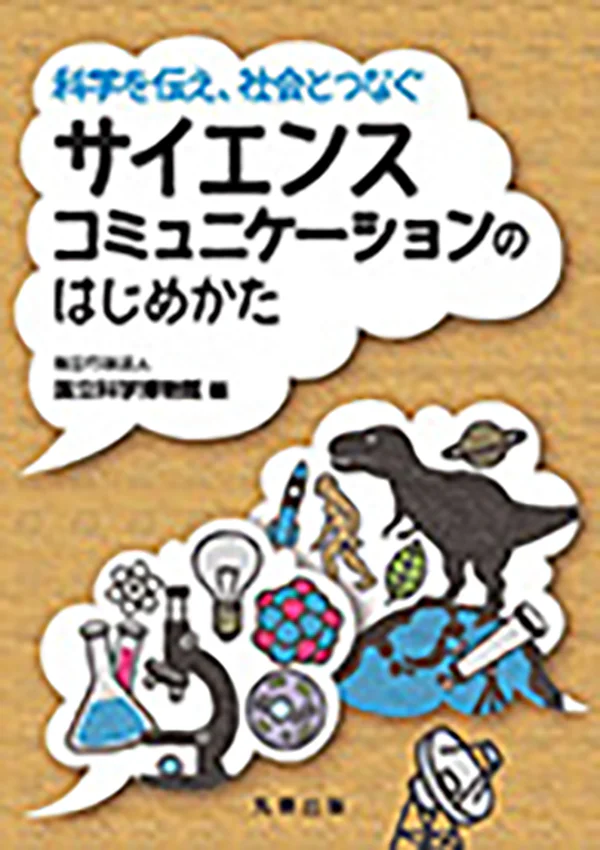Science Communicator Training Programs

Applications for the National Museum of Nature and Science Science Communicator Training Practical Course 1 (SC1) for fiscal year 2025 are now closed. (May 1, 2025)
Details regarding the National Museum of Nature and Science Science Communicator Training Practical Course 1 (SC1) for fiscal year 2026 will be announced on this page once the event schedule is finalized.

Science communicators provide opportunities for everyone to think and act proactively about science, fostering a sustainable society where people, nature, and science coexist. They connect people with each other and science with society. Through theory and practice, this program comprehensively develops four essential qualities and abilities, cultivating the power to realize “connecting knowledge creation.”
Curriculum Overview
SC1 Science Communication I

Learning Theory
What is science communication? What is science? Starting with these fundamental questions, you will learn theory grounded in practice from instructors active in various institutions and fields, including media, research organizations, universities, and museums. You will also learn effective presentation methods for communicating science to diverse audiences.
Developing Practical Skills
Through interactive dialogue and discussions with instructors and fellow participants, you will develop and practice gallery talk content to communicate your specialized field to others. Instructors will also provide feedback on assignments related to science communication, teaching you how to write and express ideas effectively for impactful communication.
SC2 Science Communication ②

Learn the Theory
You will learn the theoretical knowledge necessary for planning and operating science events, including how to develop plans and write proposals for implementing science events, as well as methods for actual event execution and risk management.Develop Practical Skills
You will explore methods for connecting experts with the general public and will actually plan and operate science events as a team, featuring our museum researchers as guest lecturers.Application Guidelines
Course Overview
| Program Title | Science Communication 1 (SC1) | Science Communication 2 (SC2) |
| Target Participants | Graduate Students*1, Museum Staff, and other Professionals | Those who have completed SC1*2 |
| Delivery Method | In-person and online formats, etc. | In-person and online formats, etc. |
| Program Duration | May – August 2025 | October – December 2025 (Tentative) |
| Number of Sessions (Periods) | 34 Sessions*3 | 30 Sessions (Tentative)*3 |
| Enrollment Capacity | Approximately 20 | Approximately 10 |
*2: Individuals who completed our SC1 program in FY (Fiscal Year) 2024 or earlier are also eligible to apply.
*3: Students enrolled in the Graduate Schools of University of Tsukuba, Tokyo Polytechnic University, and Tokyo University of Agriculture and Technology (Graduate School of Engineering, BASE, and Graduate School of Agriculture) may receive academic credit upon completion of this program. Please note that the number of recognized credits and the availability of credit recognition vary depending on the specific graduate school and affiliation. For detailed information, please contact your university directly.
Tuition Fee
Each course: ¥63,000 (¥31,500 for students of partner universities)Completion Requirements (SC1)
Course completion is determined through a comprehensive evaluation considering pre-assignments, post-assignments, class attendance, and participation. Only students with an attendance rate of 70% or higher in the course will be evaluated.A certificate of completion will be awarded to those who complete the course and achieve a satisfactory grade.
Application
1. Application Information (Required Fields)
This call for applications is for “Science Communication 1 (SC1)” only.
Please complete the required information below and apply using the Gmail address you plan to use for the course. For details on how we handle collected personal information, please see “Handling of Personal Information”.
*This course will use Google Classroom for assignments and other purposes. To ensure smooth course operations, please apply using Gmail.
- Name (with phonetic reading), Age
- Address, Phone Number
- University Name, Graduate School Name, Research Field, Academic Year*
Working professionals: Please include your current organization name, department name, and areas of interest. You do not need to include your alma mater. - Motivation for Applying (approx. 400 characters)
*Please also mention how you plan to apply what you learn in this course going forward. - When discussing or conveying opinions to people with differing viewpoints, what have you consciously focused on? Please describe this, including specific examples from your own experiences. (Approx. 400 characters)
- Whether you wish to enroll in Science Communication 2 (SC2) this academic year
- Regardless of whether they have an interest in science, please clearly express your research/specialty field in a way that makes everyone interested in your work. (1 A4 page, diagrams acceptable. Be sure to include your name.)
For items ① to ⑥, complete the format provided and attach the file to your email with your name clearly stated in the filename.
For item ⑦, create a file considering the points below and attach it to your email.
- Be sure to include your name in the filename and on the document itself.
- Please send newly created files.
- The total size of attachments must be within 3MB.
- Acceptable file formats are Word, Excel, PowerPoint, PDF, and JPEG.
- If created on MacOS, please include the file extension (e.g., docx, xlsx, pptx, pdf, jpg).
2. Important Notes Regarding Course Enrollment
Please read the important notes below and agree to them before applying for this course.Important Notes Regarding SC1 Course Enrollment(リンクを新しいタブで開きます)(685.0 KB)
3. Application Method and Deadline
Be sure to review the application guidelines,SC1 Course List and Schedule,(リンクを新しいタブで開きます)(196.6 KB)、andthe Important Notes Regarding Course Enrollment.(リンクを新しいタブで開きます)(685.0 KB)1.Submit your application via Gmail to the address below, attaching the files containing the required information listed in(Application Information)(items ①–⑥) and the file containing item ⑦.
SC Course Coordinator E-mail: sc@kahaku.go.jp
Applications are now closed. Thank you for your many applications.
4. Participant Selection and Notification
We will conduct selection based on the application information submitted at the time of application and plan to notify applicants of their acceptance status via email on or after Friday, May 9, 2025. Details regarding tuition payment will be provided along with the acceptance notification.Frequently Asked Questions
Regarding the subject
Regarding Course Participation
Regarding Course Evaluation
Please note that there are specific sessions that require mandatory attendance.Refer to theSC1 Course List and Schedule(リンクを新しいタブで開きます)(196.6 KB)for details. If your participation time due to tardiness or early departure is less than two-thirds (2/3) of the total class time, the session will be counted as an absence.
Other Information: Book Recommendation

"Science Communication no Hajimekata: Kagaku o Tsutae, Shakai to Tsunagu"
Edited by:National Museum of Nature and Science
Published by:Maruzen Publishing Co., Ltd.
Format:A5 size, 192 pages
Price:¥1,800 + tax
This book compiles the essential knowledge and practices from the Science Communicator Training Program that the National Museum of Nature and Science has conducted for over ten years. It concisely summarizes the philosophies and expertise of leading
professionals working in various fields, including research institutions, media, and corporations, not just those in the museum sector.
We highly recommend this book as a valuable reference.